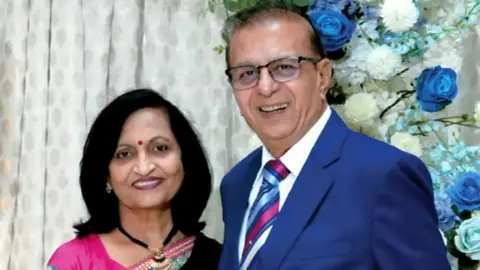The tragic aftermath of the Air India plane crash has raised significant concerns regarding the identification and return of remains to grieving families. In a heart-wrenching account shared with the BBC, Miten Patel—the son of Shobhana Patel, a victim of this disaster—revealed that additional remains were discovered in his mother’s casket upon her return to the United Kingdom. This shocking revelation has prompted him to question the integrity of the body identification process in the immediate aftermath of the crash, which claimed the lives of 260 people shortly after takeoff from Ahmedabad.
Miten Patel expressed his distress over the mix-up, stating that the coroner identified the wrong remains and left him in a state of anxiety, wondering how many others might have been misidentified as well. The Daily Mail reported that numerous families were impacted, with reports of incorrect bodies being sent to loved ones, evoking deep feelings of upset and uncertainty among those affected. India’s foreign ministry responded to these allegations, asserting that the remains were handled with “utmost professionalism” and dignity. They further assured that ongoing communication with UK officials was in place to address these critical concerns.
A spokesperson from the UK government reiterated that the formal identification of bodies falls under the purview of Indian authorities. They emphasized that the UK was collaborating with both the Government of Gujarat and the Government of India, supporting the coronial process on behalf of the Inner West London Senior Coroner. This complicates the situation more, as families seek clarity and resolutions for their grief.
On June 12, Ashok and Shobhana Patel were aboard the unfortunate flight traveling home to reunite with their sons and grandchildren. The crash, which occurred near Ahmedabad in western India, resulted in their immediate deaths, positioning them among the first bodies to be returned to the UK. For Miten, the confirmation of remains included in the casket that didn’t belong to his mother was “obviously very upsetting.” Although he conceded the unpredictability of errors in such high-pressure circumstances, he stressed the importance of accountability in ensuring the correct remains are returned.
He urgently raised concerns about whether other remains might have been mixed alongside his mother’s in the casket, illustrating the palpable anxiety faced by families grappling with loss. Reports emerged detailing two specific incidents where families received entirely incorrect bodies, and in one case, multiple remains were reportedly found in a single casket—a stark revelation of the ongoing chaos.
India’s foreign ministry committed to addressing these discrepancies, noting their continuous cooperation with UK authorities from the moment concerns were brought to surface. They reiterated that proper identification protocols were executed and that every effort was made to maintain dignity and professionalism during the handling of the deceased.
Legal representation for the families impacted by the crash has voiced their expectation that UK Prime Minister Sir Keir Starmer will address these serious concerns with Indian Prime Minister Narendra Modi, scheduled for a visit to the UK in the coming days. Families demand urgent answers and assurances regarding the status of their loved ones, underscoring the emotional turmoil they are enduring.
The Foreign Office in the UK has pledged to continue offering support to bereaved families, providing dedicated caseworkers and family liaison officers to assist those in need. The ongoing investigation into the Air India crash and the handling of the victims’ remains continue to be subjects of intense scrutiny, both by authorities and by grieving loved ones seeking closure.












